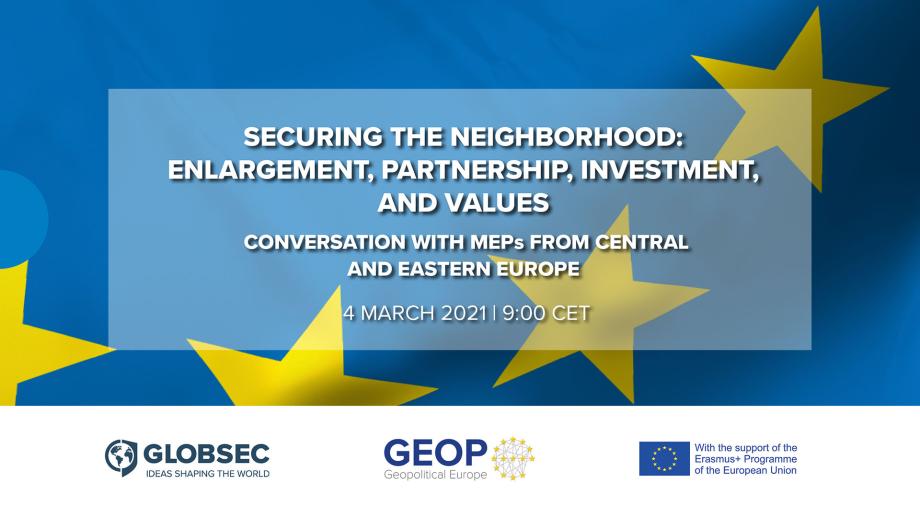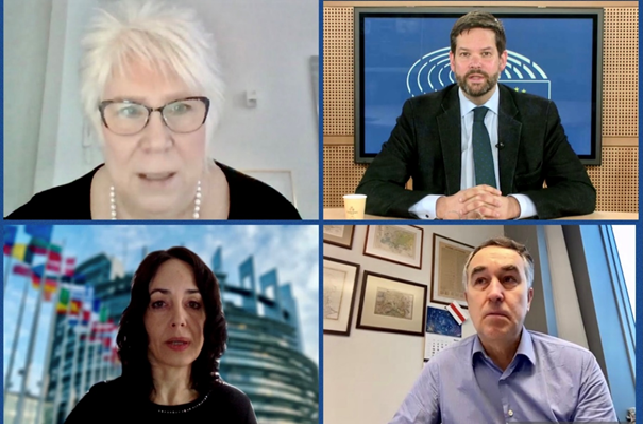Securing the Neighborhood: Enlargement, Partnership, Investment, and Values - Event Summary

The online event, held by GLOBSEC on 4 March 2021, on the current state of play and future prospects related to the EU’s neighbourhood policies and strategy hosted Members of the European Parliament (MEP) representing Central and Eastern Europe (CEE) and a select group of experts, academics, public administrators, and media (21 participants from 9 countries).
The MEPs in the conversation included:
Petras AUŠTREVIČIUS, Member of the European Parliament, Renew Europe, Lithuania
Marina KALJURAND, Member of the European Parliament, Progressive Alliance of Socialists and Democrats, Estonia
Miriam LEXMANN, Member of the European Parliament, European People’s Party, Slovakia
Lukas MANDL, Member of the European Parliament, European People’s Party, Austria
As the deterioration of security and stability in Europe’s neighbourhood, puts international efforts of democracy promotion at risk and brings geopolitical tensions, this online event looked to ask what the role of the EU should be and how can CEE play a more active role. Our speakers primarily agreed on the fact that the Eastern neighbourhood cannot be ignored, and that the EU, while bureaucratic and slow-moving at times, must show that it is dedicated to the region as a reliable partner and is willing to support democracy and development.
The global composition of the world requires the EU to be dynamic, according to MEP Petras Auštrevičius. Before the EU can realise any vision of becoming a global player, they must look to their immediate neighbours, including the Eastern Partnership region and the Western Balkans. Securing, engaging, and supporting the countries will be a determining factor for how the EU can become a global player. Since everything is globally connected, the EU needs to engage more practically and more proactive. Instead of supporting countries after they experience a crisis, or neglecting countries altogether, the EU should commit to providing straightforward and direct support before a crisis occurs. If the EU is to have global ambition, they must not shy away from interactions with their closest neighbours.
MEP Marina Kaljurand stressed the importance of keeping the interests of the people as a high priority rather than party interests. In her opinion, the Eastern partnership has been an overall success, specifically because each country has the right to decide their own future, and they have made this future very clear. Close integration with the EU, strong transatlantic relations, and democracy are all some of the most important aspects of the futures that Eastern partnership countries desire. The role of the EU in this is to continue supporting these countries on their path of democratic reforms. It will be a challenge to keep the topic as a priority for the EU since there is not too much interest or awareness across member states. Despite this, a common policy that may be weak in some respects is much better than no common policy at all. The EU must speak in one voice and reassure its partners in the region that it stands with them.
The importance of European values is vital to the process of supporting the Eastern partnership region and Western Balkan countries as well. The same values that brought member states together should also drive foreign policy, but these values are often politicised, compromising the possibility for an open discussion or for practical policy engagement, according to MEP Miriam Lexmann. Value-based policies become impossible because the meaning of those values becomes diluted and misunderstood. Instead of hiding behind the idea of a global world and engaging with oppressive regimes on an economic basis, the EU must face the fact that these economic ties provide avenues for these regimes to corrupt their own nations and even some EU member states as well. China may be good for business, but the EU often forgets its own values when it comes to relations with China. Engaging with China and other less democratic global players brings immediate economic profit, but it also brings a vulnerability to the neighbourhood. The EU may not consider economic corruption as a human rights breach, but in reality, it inhibits citizens of their economic freedom.
For MEP Lukas Mandl, in order for the EU to reflect its values and strengths, it must work especially hard to hold onto the Western Balkans especially after suffering the loss of the UK as a member state. While each of the six Western Balkan countries is in different stages of democratisation, they each identify with European values and defend their freedom. It is vital for the EU to treat these countries on the same level as global partners instead of imposing policies and values on them as it has historically done. The bureaucracy of the EU once again becomes a problem — it makes the value of friendship more difficult to achieve because there is unanimity in decisions made at the EU level. The lack of consistency in the EU’s common foreign policy gives external actors an opening for attacks on the region. It is time for the EU to convey a message that it will fight for the rule of law and for reforms not as an administrative chore, but as an investment that will lead to better health, education, and jobs.

Main takeaways:
- The EU has a strong record and thus a pronounced strength in mediation. It should use it proactively in the neighbourhood.
- Instability in the Eastern neighbourhood can be tackled by building trust among all involved actors. This will require gradual mechanisms put in place and getting away from the notion of zones of influence. All should engage.
- It is important to remind the people of the Eastern Partnership region and the Western Balkans that enacting democratic reforms is good for themselves and not simply a necessary administrative step towards closer association with the EU.
- Through the European Endowment for Democracy, the EU does have a good tool to promote democracy in the neighbourhood civil societies. However, the tool needs to be re-calibrated as it often does not involve ordinary citizens but civil society “elites.”
- MEPs have an important role in the process of forging and influencing policies. They are the connection between the EU, the national parties and their constituencies. This connectedness can be very useful.
- What is missing often when discussing the Eastern neighbourhood and the Western Balkans is to seek a vision. Solving challenges is naturally important but with clear positive perspective policies like enlargement or closer association of the Eastern neighbourhood can regain interest among member states and citizens and lead to creative solutions.
*This summary is published within GLOBSEC GEOPE—Geopolitical Europe: Are the Member States Ready for It? Project supported by Jean Monnet Actions of the EU’s Erasmus+ program.
The European Commission support for the production of this publication does not constitute an endorsement of the content, which reflects the views only of the authors, and the Commission cannot be held responsible for any use which may be made of the information contained therein.

